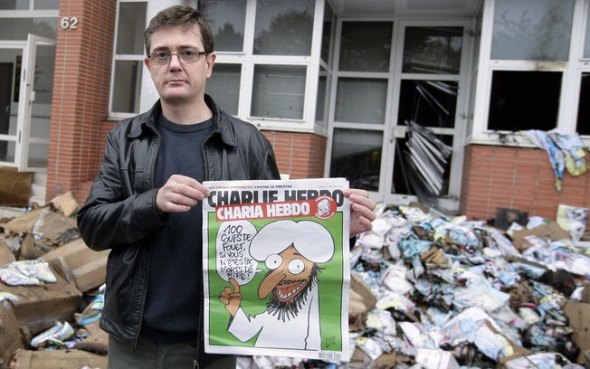Islamist Violence Harms Muslims the Most

According to Ayaan Hirsi Ali, the reaction to the Paris fire-bombing of the French satirical magazine Charlie Hebdo is another example of how fearful Western society is of offending Islamic extremists.
Hirsi Ali is the Somali woman who fled to Europe to escape an arranged marriage with someone in Toronto. She went to university and was elected to the Dutch Parliament. She migrated to the U.S. after collaborating on a documentary about the oppression of Muslim women (Submission) that resulted in filmmaker Theo Van Gogh being murdered and death threats against her.
Her two books, Infidel and Nomad are persuasive accounts of the plight of women under Islamic law and culture. A scathing indictment of extremism that plagues the faith.
Her recent article on huffingtonpost.ca, cites the fire-bombing of Charlie Hebdo’s offices after the magazine facetiously named the Prophet Muhammed as “guest editor,” with the cover drawing depicting Muhammed promising “100 lashes if you don’t die from laughter.”
Ali notes that some commentators rationalize the fire-bombing on grounds that the magazine’s “‘offensive’ issue provoked a predictably violent response from extremists.”
She quotes an article by Time magazine’s Paris bureau chief, Bruce Crumley, saying that mocking Islam is to “openly beg for the very violent responses from extremists their authors claim to proudly defy in the name of the common good. What common good is served by creating more division and anger, and by tempting belligerent reaction?”
Hirsi Ali points out that offensive “scatological cartoons of world leaders and caricatures of Jesus and the Pope” rarely result in violent reactions.
The upshot of the Time’s article is that “in a free society, a newspaper can ridicule and stigmatize whomever it chooses, except those who demonstrate a willingness to respond with violence. Extremist groups must be exempt from satire or criticism – or the blame for ensuing carnage falls squarely on the shoulders of the offending publication.”
In other words, self-censorship is the order of the day–something not unknown in the Canadian media when it comes to Islamic extremists.
Ali cites examples of self-censorship in the U.S.: Yale University Press declining to reproduce Danish political cartoons of Muhammad in a book about the controversy--“fearful of attracting the wrath of militant Islamic factions.”
Random House cancelled the publication of a historical romance novel featuring Muhammad’s youngest wife, Aisha. “Comedy Central censored an episode of the TV program South Park that featured Muhammad wearing a bear suit.”
Ali says “fear of Islamist violence” has inhibited critical discussion of the Koran, and has “silenced those who would decry the treatment of women in some Islamic communities.”
Accordingly, the message is that “Muslims, in general, are violent so it is better not to provoke them ... so let’s give them special treatment. What sounds like a well-intentioned and honourable message is, if you think about it, denigrating and racist.”
Satire and questions by media are a hazard of democracy.
But for militant Islamists “there is no ideological distinction between fire-bombing a newspaper’s headquarters and murdering a filmmaker like Theo Van Gogh.”
That said, a majority of non-militant Muslims may not like Muhammad satirized, but they understand and accept free speech. They are the ones most damaged by minority extremism -- and the cowardice of those who make a virtue out of capitulating to threats of violence.

